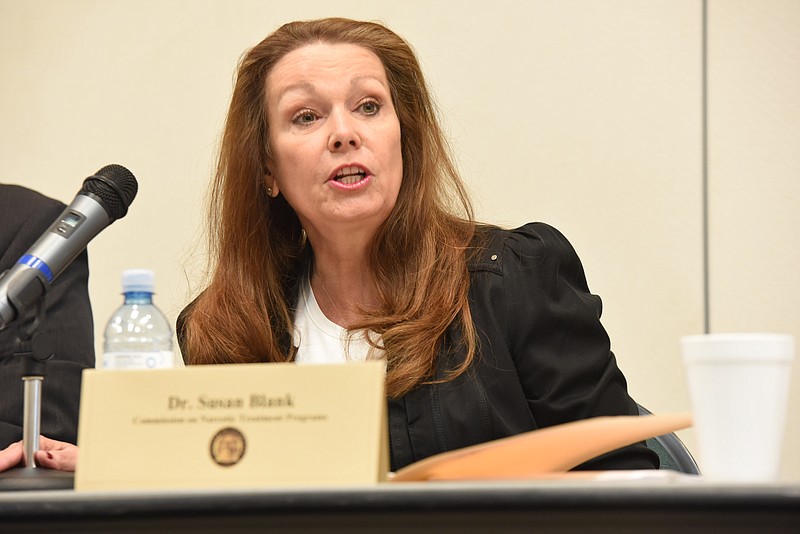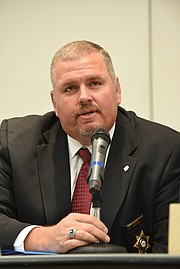RINGGOLD, Ga. - Only four surveyors inspect about 500 drug-related health centers in Georgia.
Melanie Simon, the Department of Community Health's division chief for healthcare facility regulation, testified during a legislative study committee hearing Tuesday morning that the department's limited staff oversee all 70 narcotic treatment programs in the state. In addition, they are responsible for surveying 424 drug abuse treatment and education programs.
"Should we have more people to inspect facilities across Georgia?" state Sen. Jeff Mullis, R-Chickamauga, asked.
"I think it certainly bears investigation," Simon said.
Jonathan Connell, a defender of narcotic treatment centers and president of Opioid Treatment Providers of Georgia, said he welcomed more oversight. Asked by a member of the committee whether every clinic follows the proper protocols, Connell said he can't possibly know for sure.
"I've been doing this since December 1999," he said. "Early on, we had surveyors that were very educated in this. And there are some times that we have surveyors that are not educated on this, in this criteria. It is very unfortunate."
The committee, of which Mullis is chairman, hopes to come up with ideas about how Georgia lawmakers should regulate narcotic treatment programs - commonly referred to as methadone clinics. In particular, Mullis wants to know why there are so many more of these clinics here than in surrounding states.
While Georgia holds 70 narcotic treatment programs, according to the Substance Abuse and Mental Health Services Administration, Alabama and Tennessee feature a combined 36 clinics. The issue has particularly been of concern to local politicians: There are three such clinics in Walker and Catoosa counties, with a fourth clinic now in the "permitting phase," Ringgold City Manager Dan Wright said.
Mayor Nick Milwood and other Ringgold city councilmen have spoken out against the clinic, arguing it will attract addicts to a school bus stop downtown. To look into the issue, Mullis sponsored legislation to create the study committee and place a one-year moratorium on licenses for new narcotics treatment programs.
On Tuesday, during the first committee hearing, doctors and owners of clinics in Georgia defended their methods. Dr. Mark Peterson, medical director of Private Clinic North in Rossville, said users of drugs like heroin can become dependent on opioids. They will become sick without at least some of the drug.
So, Peterson said, doctors give them a small amount of methadone or buprenorphine. The patients have to take them at the clinic. They also go through individual and group therapy. With time, patients who stay in the program take weaker forms of the drug, and they are allowed to take their weekly doses home.
Dr. Jean Bonhomme, the former medical director of Alliance Recovery Center, said the treatment allows recovery addicts to function throughout the day. Otherwise, they can struggle to hold jobs.
"It's not giving gin to an alcoholic," he said, rebuffing a criticism he has heard. "An alcoholic cannot function on gin. A heroin addict or Oxycontin addict can function on methadone."
Simon said clinics go through several forms of regulation. They have to get a license from the Department of Community Health; join a registry with the Department of Behavioral, Health and Developmental Disabilities; register with the Drug Enforcement Agency and follow the standards of the Substance Abuse and Mental Health Services Administration.
Still, Catoosa County Sheriff Gary Sisk said Tuesday he believes there are loopholes that allow people to take advantage of narcotic treatment programs. He thinks people can use participation in such a clinic as a way to mask serious drug abuse from an employer, can lie to a doctor to trick them into thinking they need the drug and can sell the medication once they have earned the right to take it home.
Connell told the sheriff that methadone delivers an opioid in such a small dose that he doesn't see people trying to abuse it in the streets.
"They're not taking it to get high," he said. "They're taking it because they have withdrawals."
Contact staff writer Tyler Jett at 423-757-6476 or tjett@timesfreepress.com. Follow him on Twitter @LetsJett.

